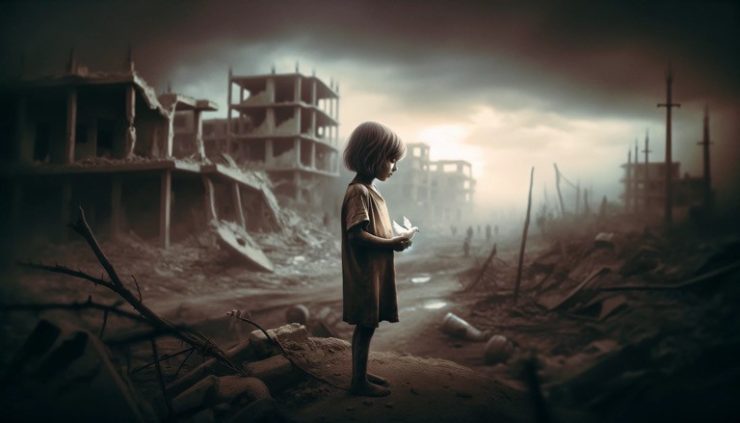This week, the world commemorates both World Children’s Day (November 20th) and International Day for the Elimination of Violence Against Women (November 25th), drawing our collective focus to children who find themselves caught up in conflicts or experiencing the brutalities of war. These occasions serve as reminders and an opportunity to bring attention to these innocent lives’ hardships and needs.
2023 has seen unparalleled destruction in regions like Gaza, with the death toll of children surpassing that seen in high-conflict zones like Ukraine, Afghanistan, and Iraq. Statistics provided by Palestinian officials and reported by Aljazeera indicate 133 infants under age one have perished. At the same time, an estimated 8,665 have experienced injuries, and about 5,500 have lost their lives due to ongoing fighting – not simply numbers but rather unfortunate collateral victims from an unending global conflict.
Their daily lives stand in stark contrast to their peers from more peaceful parts of the world in that schools that were once safe havens have now become makeshift refugee camps, taking away fundamental rights of these children to receive an education, play freely, and experience normal childhood without fear or uncertainty.
Television screens may capture moments of joy from these children, yet their smiles cannot forever mask underlying trauma. Many in these regions struggle with identity issues and prospects while questioning why ethnicity or adult decisions must cause suffering for so many of their peers. War has replaced childhood innocence with its harsh realities of death and injury, leaving deep psychological scars for these kids who witness unimaginable horrors such as death, severe injuries, and constant threats of violence. In contrast, some may find relief through psychological therapies while others suffer long-term struggles of pain, anger, and potentially turning toward violence through lifelong trials and recovery while continuing vengeful cycles of retributive cycles of revenge, cycles of pain that continue even as adults take sides during wartime.
Conflict zones present a unique set of circumstances where children cannot enjoy childhood in its entirety – regardless of geography, religion, race, skin color, or ethnicity. Their lives in war zones illustrate global inequality as we assess priorities and values around us – which need to change urgently if children from these parts can enjoy childhood in its most whole measure. We should recognize and act upon this reality during these critical days by intensifying efforts to protect these young lives; and fight tirelessly for their rights while striving towards creating an equal and safe world where each child can experience childhood’s pure innocence and joy of childhood throughout their entire childhood journey regardless of where birth they come from.
In this age of globalization and interconnectedness, the international community bears a collective responsibility. While governments and non-governmental organizations strive to offer assistance and promote peace-making efforts, their efforts often encounter roadblocks due to political divisions, complex structures, and resource restrictions – successes often represent just a fraction of what needs to happen. They should prioritize diplomatic solutions over military interventions while prioritizing child safeguarding as one of their top priorities.
As individuals, we can contribute by supporting organizations working in these regions, remaining knowledgeable of issues affecting these nations, and using our voices to advocate for peace and justice. Our expressions depend on individual perspectives on what facilitates peaceful coexistence; similarly, inaction or passivity are expressions, too!
Given this shocking reality, one is forced to ask whether these children are living in the age of innocence or a world of carnage. Such stark contradictions demonstrate childhood’s decline and human rights violations that violate fundamental values.
Figures related to the ongoing conflict in the Gaza Strip serve as a tragic illustration of its severity, representing not simply numbers. Still, instead, premature lives were lost, unrealized dreams dashed, and hopes dashed for young victims of war.
As we celebrate World Children’s Day and International Day for the Elimination of Violence Against Women, should we only pause and reflect here on our commitments toward these young victims of conflict? Let us not just contemplate but act together to transform children from survivors of carnage into participants in a peaceful world of opportunity. Acknowledging the suffering caused by conflict and violence on young minds is critical. They deserve not just our sympathy; their circumstances require our active engagement as they pursue dreams free from war devastation while benefitting from education designed to nurture growth. We should recommit ourselves to creating a safe, just world for them all on these two important dates.













